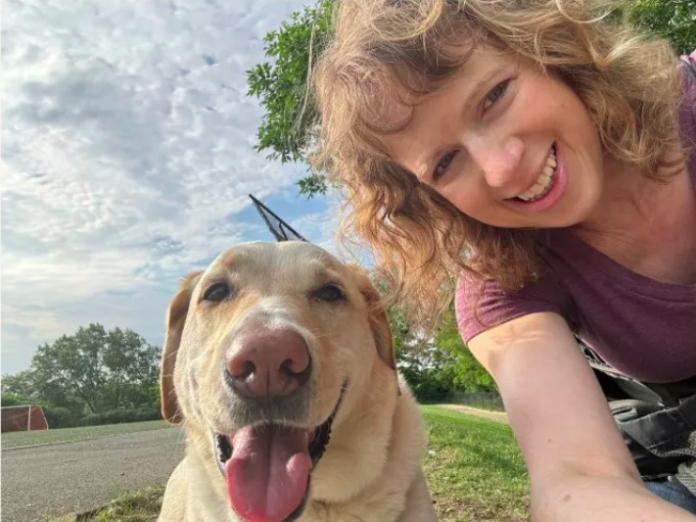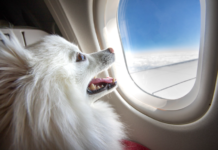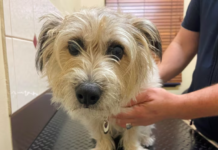Last Updated on June 7, 2024 by Fumipets
Beau Became My Child: A Brutal Dog Attack at Daycare Almost Broke Us
In a heart-wrenching journey filled with love, trauma, and resilience, Tracy Strauss shares her story of how her dog, Beau, became her child. From the initial joy of adopting Beau to the harrowing experience of a brutal dog attack at daycare, this tale explores the depths of the human-animal bond and the challenges faced when caring for a pet with severe separation anxiety.
Adopting Beau: A New Beginning
I walked him into the clinic through the back door, as the staff instructed: Leave him there and close the door behind you. He didn’t suspect a thing.
A moment later, separated, I heard him vehemently protesting what I’d done. I hated tricking Beau, but it was the only way to get him the help he needed.
I was 49, single, no kids, and never married. I wanted to be coupled with kids, but for years after my PTSD diagnosis, shame kept potential love and family at a distance.
In September 2020, Beau became my partner and the child I never had. He was my first dog, a yellow lab mix found in rural Mississippi. With soulful brown eyes and a white stripe on his golden forehead, I instantly loved him.
Early Challenges: Beau’s Separation Anxiety
A week after we met, I left him alone in my one-bedroom city condo for the first time to run an errand. He barked, cried, hyperventilated, and soiled and injured himself in my absence.
There were barking rules in my building: An offense garnered a hefty fine. Friends told me to treat him like a baby—let him cry it out, he’ll learn—but doing so only made his anxiety worse.
After ten months of searching for the right trainer, all the while hoping Beau might grow out of what was diagnosed as separation anxiety disorder, I began addressing the problem through medication and slow desensitization behavior modification.
Finding Daycare: A Temporary Solution
Beau didn’t tolerate at-home sitters, but he loved socializing at a small local doggie daycare, so that’s where he went during my in-person teaching hours at the university. This was the only way I could avoid re-homing him, an option I couldn’t bear.
For a year-and-a-half, the daycare manager texted me pictures and videos of Beau playing happily and reciprocally with others. She said he was their best-behaved dog. She paired with him for a Halloween costume contest and messaged me after hours and on weekends to ask how he was. She said she loved him and called me her friend.
The Brutal Attack
The morning Beau was attacked, he eagerly trotted into the daycare, heart-forward, not even looking back at me for reassurance before I left.
An hour later, the daycare manager phoned. Beau was bleeding. He had severe lacerations and bite wounds. She said it wasn’t his fault, but she dismissed him. The dog who harmed him didn’t suffer a scratch and was allowed to stay.
I’d learn from a former employee that the manager had started drinking. Once, just prior to the attack, I witnessed her slurring her words and stumbling. I asked if she was okay. She brushed it off as a medication side effect.
I dismissed the idea that she could be inebriated or that she was lying because I couldn’t bear the thought that the person and the place I’d trusted were untrustworthy.
Aftermath: Beau’s Recovery
At the clinic entranceway, Beau was ferociously barking, his 80-pound body bucking as he tried to wrangle himself out of his harness. Two staffers couldn’t corral him and told me to take him inside through the rear door, which he didn’t associate with the clinic.
The propofol was supposed to last an hour, but ten minutes into the surgery, I heard the sudden frantic thud-thud-thud of Beau’s body, as if he were trying to escape, and the vet’s muted voice saying: “No, no, no—”.
I wondered if Beau would recover from his trauma. I wondered if I’d ever recover from mine.
Dealing with Trauma: Personal Reflections
I was a child when it happened. I asked for a dog, a companion. My father said we couldn’t have a dog because he was allergic. As consolation, he said he’d be mine. He got down on the floor and barked and panted and then his playful tone suddenly turned sinister as he pushed me over and got on top of me.
The sexual assault was over in an instant. I told myself it couldn’t have happened. I was ashamed that I’d let it. I didn’t want to feel the unfathomable betrayal or the loss of a kind of love I thought I couldn’t live without.
Decades later, when I received a court letter informing me of my father’s death, Beau, not anyone else, was beside me. His eyes were soft and penetrating, as if he knew my past, what I was feeling and thinking. He saw me.
The vet came out to see me, reporting they’d successfully repaired Beau’s injuries. Beau walked wobbly, as if he were drunk, wearing a cone of shame as large as a lampshade. For days after the attack, he cowered and cried at the sight of another dog. At home, he paced and hid in my bathtub.
Finding a New Daycare: A Safer Environment
Finding daycare was dire. I learned the dog daycare industry, unlike the childcare industry, lacked regulation, rendering many facilities dangerous bastions of illness and injury. Most had only three attendants per one hundred dogs. But I found a reputable one with a 12:1 ratio 20 minutes away.
For several weeks, Beau seemed very happy there. I believed the past was behind us. But then he began to show nervousness. He tried to intervene when dogs played roughly.
The staff thought he was reliving his trauma, trying to prevent an assault: “We advise that you hire a sitter.”
When I picked up Beau, he was crying. I got into the car and cried, too, because I loved him and without a viable care option, I was going to lose him.
The Struggles of a Pet Parent
Unlike if I had a child at home alone, my employer was not going to understand that I needed to stay home because my dog wasn’t yet capable of being home by himself.
Call it denial or refusing to accept defeat: I interviewed over 50 potential dog walkers and sitter candidates on Rover and Wag, which felt like online dating—I was frequently ghosted or lied to. Many said they would not sit for a dog with separation anxiety.
Beau’s separation anxiety regressed as we met stranger after stranger. Prior to losing daycare, he’d tolerated two hours solo. Now his tolerance crashed at two minutes.
I was housebound. I missed my cousin’s wedding, a concert, a business conference. Months passed. I went nowhere. I grew very anxious and depressed. I didn’t know anybody else who couldn’t manage to leave their dog home and live a normal life.
A New Hope: Tom the Dog Walker
Unlike a single mother who can’t be somewhere or attend a special event because of a lack of childcare, I didn’t have a legitimate excuse.
I considered the idea of an end-date. Life with Beau was unsustainable, but he was the child I never had, and the idea of life without him was devastating.
“What do you need?” Tom asked. He was a dog walker, mid-forties, understated, gentle, humorous.
Asking for help, trusting help, seemed too hard. I was clammy and tongue-tied trying to say what I needed. I needed to put aside my shame.
On the hand-off, Beau screamed as if he were being murdered. Ten minutes later, Tom texted a photo of Beau sitting on the shady sidewalk, grinning. “At first I wasn’t sure if this was going to work,” Tom said, “But after a couple of minutes he was fine.”
A Brighter Future: Trust and Healing
If history predicted the future, I doubted the arrangement would last. A few weeks into Beau’s scheduled walks, Tom confirmed my distrust by canceling last minute.
I took Beau out myself. When we reached the corner of a quiet side street, Beau stopped and looked at me. We always went straight. Now he turned right. I let him lead.
We ended up in a distant neighborhood, at the entrance to a fenced-in yard. Beau stuck his nose in between the slats of the gate.
Tom, and his dog Lucille, lived there.
It’s been a year of Tom taking Beau while I go to work. The arrangement isn’t forever. After close to 800 separation anxiety training sessions, Beau and I are finally learning that it’s safe for me to go out into the world while he stays home.
In our partnership, and in my parenting, he can trust that I’ll always come back, and I can trust love to heal wounds, knowing there’s no shame in being seen.
Conclusion
The journey with Beau has been a rollercoaster of emotions, from the joy of adoption to the trauma of a brutal attack, and finally, to the hope of healing. Through it all, the bond between Tracy and Beau has grown stronger, demonstrating the incredible resilience of both human and animal hearts.
Frequently Asked Questions (FAQs
1. What caused Beau’s separation anxiety?
Beau’s separation anxiety likely stemmed from his early experiences and the abrupt changes in his environment after being adopted.
2. How did Tracy address Beau’s separation anxiety?
Tracy used medication, slow desensitization behavior modification, and eventually found a suitable daycare and a reliable dog walker to help manage Beau’s anxiety.
3. What are some signs of separation anxiety in dogs?
Common signs of separation anxiety in dogs include excessive barking, whining, pacing, destructive behavior, and self-injury when left alone. Some dogs may also soil the house or refuse to eat while their owner is away.
4. How can pet owners find a reliable daycare for their dogs?
Pet owners should thoroughly research and visit potential daycare facilities, check for proper staff-to-dog ratios, read reviews, and ask for recommendations from trusted sources. It’s also important to observe the facility’s cleanliness, safety measures, and how staff interact with the dogs.
5. What should pet owners do if their dog is attacked at daycare?
If a dog is attacked at daycare, owners should seek immediate veterinary care for their pet, document the injuries, report the incident to the daycare management, and consider finding a new, more reliable facility. Consulting with a professional dog behaviorist may also help address any trauma the dog experiences.
References: Newsweek Article: “Beau Became My Child. A Brutal Dog Attack at Daycare Almost Broke Us”


















